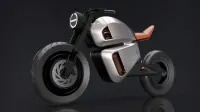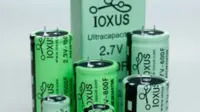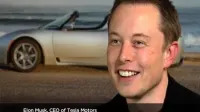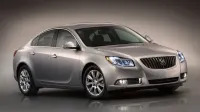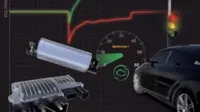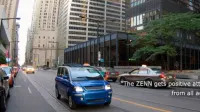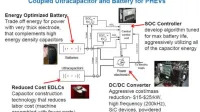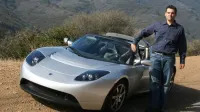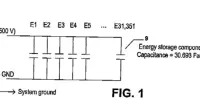Ultracapacitors
Panasonic shares plunge after profit warning, Tesla's big Maxwell deal
Maxwell brings new technologies, plus Panasonic is losing exclusivity
MIT adds new material to supercapacitor for better EVs, maybe
Raise your hand if you know what a metal-organic framework is. We didn't.
Maxwell Technologies doubles ultracapacitor production
Maxwell Technologies reports that it has more than doubled its ultracapacitor production capacity over the past year and is moving forward with its plans to increase output of its Boostcap line of ultracapacitors. To date, Maxwell has pumped out more than 15 million ultracaps, says David Schramm, the firm's president and chief executive officer, adding that "ultracapacitor sales having grown by more than 50 percent in each of the past two years and our expectation for continuing rapid growth goi
Tesla's Musk says capacitors "will supercede" batteries
While speaking at the Cleantech Forum in San Francisco, CA last week, Elon Musk, chief executive officer of Tesla, said he's willing to bet against batteries to be the technology that finally delivers the breakthrough that electric-drive vehicles need to become mainstream. Earth2Tech quotes Musk saying:
ADA Technologies to develop ultracapacitors for hybrid military vehicles
ADA Technologies, Inc. has been awarded a $70,000 contract from the U.S. Army to begin Phase 1 of the development of an electrochemical ultracapacitor for use in hybrid military vehicles. ADA's developmental work will be performed with assistance from Maxwell Technologies, the company behind the commercially-available line of Boostcap ultra
Video: Hybrid Electric Kinetic Photovoltaic Vehicle is no ordinary bike
Hybrid electric photovoltaic bike – Click above to watch video after the jump
PSA Peugeot Citroën's e-HDi Start-Stop System will use Boostcap ultracapacitors
Continental AG has teamed up with Maxwell Technologies to make their booster module more convenient and efficient. Called an E-booster, the new module is part of PSA Peugeot Citroën's mild-hybrid system, called e-HDI. Maxwell technologies is supplying their Boostcap ultracapacitors to Continental AG for the new module. Ultracapacitors have an ideal characteristic – power
Report: EEStor invites U.S. government agencies to technology demo
In the realm of vehicle electrification, EEStor and its super-duper ultra-capacitors are roughly the equivalent of Duke Nukem Forever for video game players. The creators of both products have made impressive claims and repeatedly promised public demonstrations and introductions for many years. In both cases, the creators have missed every single promised date with nothing to show for it.
Penn State and Khosla backing Recapping, could challenge EEStor for vaporcaps
Vapor vs. vapor? That could be the case as super-secretive EEStor could potentially face competition in the ultra-capacitor space from Recapping. We've never heard of Recapping before, but the startup is backed by Khosla Ventures and recently received a $1 million grant from the U.S. Department of Energy.
EESTor update from ZENN CEO Ian Clifford; demonstrations coming in 2010
EEStor, the company behind the ultralight, ultra-efficient – and ultra secret – EEStor Electrical Energy Storage Units (EESU) that could change the electric car world, still isn't giving out much information about their product. But Ian Clifford, the CEO of Zenn Motors, is talking.
EEStor "permittivity" follow-up, by someone who knows (Daryl Siry)
Following EEStor's permittivity announcement on Earth Day last week, I wrote a post that ended with a call for our readers to determine if the stated "relative permittivity of 22,500" was a big deal or not. There were some educated responses (thank you), but one refrain that kept appearing was that everyone is waiting for a real and physical demonstration of the company's supposedly a
EEStor comes up with an Earth Day announcement - it's "a huge milestone"
Delays, hype, and more delays. This is the short history of EEStor, the company that keeps on talking about what is supposed to be an ultracapa
What is regenerative braking?
Ah, fire. One of humanity's oldest ways to generate energy. Technically, you could generate energy by burning brake pads, as seen in the picture above (thanks, Flickr!), but automotive engineers have managed to come up with a way to use brakes to generate energy without going up in flames. The technology is called regenerative braking and it's the subject of this week's Greenlings.
Paris tests a new hybrid bus that uses ultracapacitors
RATP, the public-owned company that manages most of Paris' public transport system, is currently performing tests using a hybrid bus outfitted with ultracapacitors. For now, the test buses are passenger-free. The model, called Lion's City Hybrid, is supplied by German manufacturer MAN and the company claims it reduces fuel consumption about 20 to 25 percent. RATP is testing the bus in four different bus lines, which represent four different types of bus lines configurations, from suburban medium
EEStor gets patent for EESU, we get some details
Stop the presses! We've finally got some real information regarding EEStor's highly secretive capacitor-based energy storage system, though it's not exactly coming from the company itself. It seems that EEStor recently filed for patents of its new technology, which centers around a core of aluminum coated barium titanate powder immersed in a polyethylene terephthalate plastic matrix, and they've now been granted those patents. The best part for those of us who've been following the company's dev
